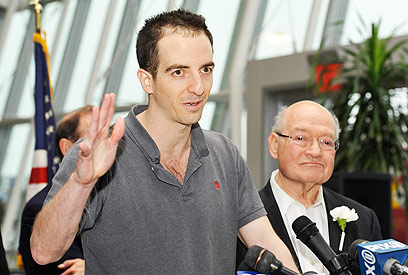
Dual US-Israeli national Ilan Grapel, who was detained in Egypt on espionage charges and released five months later, says he does not regret travelling to Egypt and forgives his jailers.
In a Washington Post opinion piece, Grapel said: "I hoped to convince the Arabs I met that my Zionism did not have to be antithetical to their interests and that we could work together for peace. But in post-revolutionary Egypt, my attempts to educate and interact with the local population led to my arrest, to solitary confinement and eventually to the threat of five simultaneous life imprisonments for 'espionage' and 'incitement.'"
Related stories:
Recounting his days in solitary confinement, Grapel noted: "I was terrified and confused. Over time I also became angry and lonely. The initial 14 days were the 'best' part of my imprisonment because there was at least human interaction. The prosecutor and I bantered about politics, religion and the Middle East conflict."

Ilan Grapel after his release. Believes in Hasbara (Photo: AP)
He added, "The conversations were jovial, mostly innocuous, save for some random accusations: 'Security reports inform us that you were smuggling weapons from Libyan revolutionaries into Egypt,' or my favorite — but perhaps irrelevant — charge: 'Ilan, you used your seductive powers to recruit Egyptian women and that is a crime.'"
Grapel was then put in solitary confinement which was interrupted twice for visits from the Israeli consulate staff. He had spent the time reading books his parents had sent them.
Responding to those who ask him for his current perspective post-revolution Egypt and his travel there he said: "My answer is constantly evolving. As my detention and recent events and repressions in Egypt make clear, the revolution brought only superficial change.
"Was my trip reckless or 'wrong'”? No," he said.
"Despite the peril, the US government sends Peace Corps volunteers to volatile regions because of the benefit of grass-roots diplomacy. Hasbara, the Hebrew term that refers to efforts to explain the Israeli viewpoint, has much to gain from such a strategy, given the pernicious myths about Israel and Jews prevalent in much of the Arab world.
"My hasbara provided a viewpoint that changed the mentalities of former Muslim Brotherhood members, the prosecutor and my guards, whose last words were 'Shalom, we hope you forgive us.' Israelis and Arabs can continue to maintain the status quo of mutual avoidance or they can dare to coexist. To those who wrongly held me, I say simply, I forgive you."
- Receive Ynetnews updates
directly to your desktop















